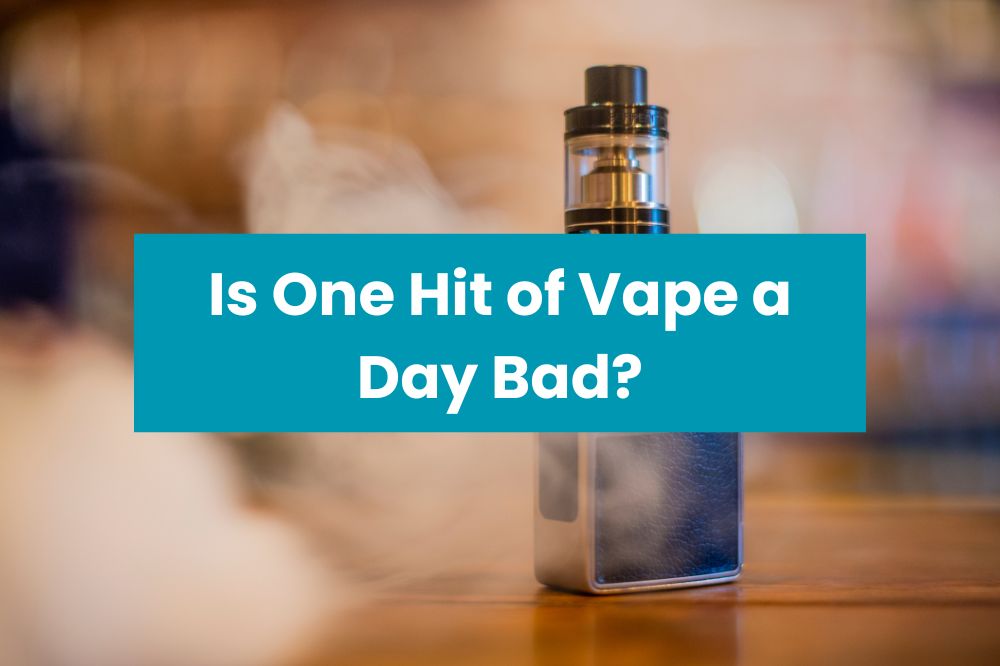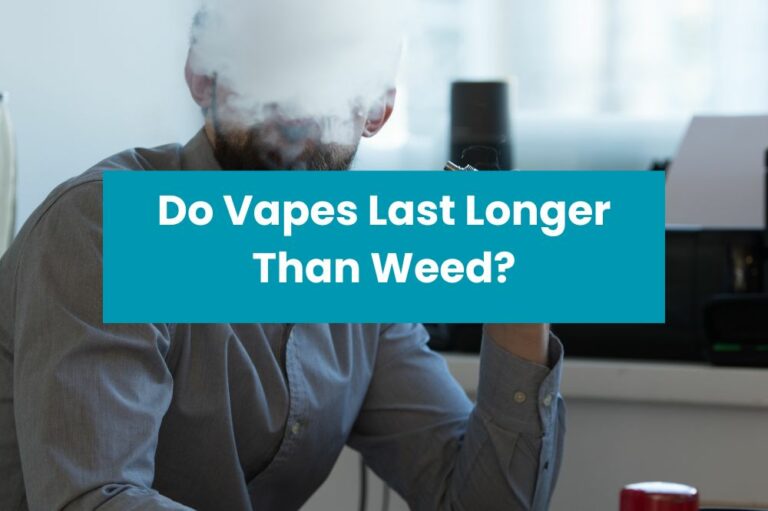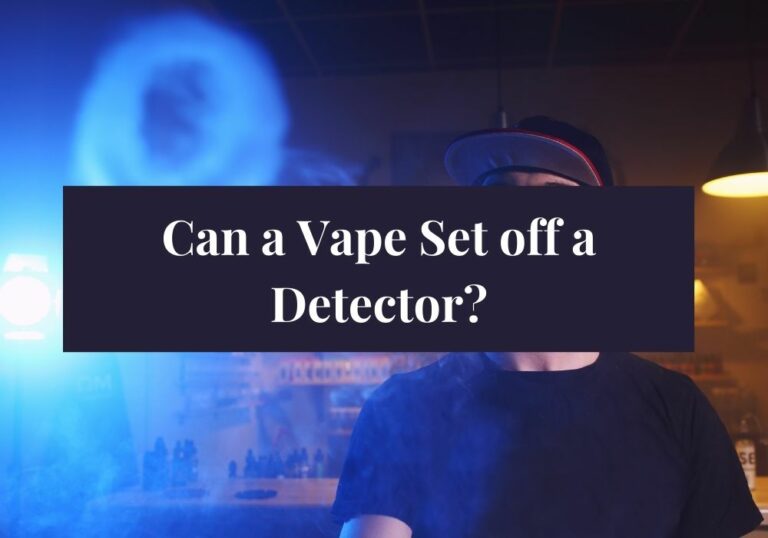Is One Hit of Vape a Day Bad?

Are you someone who enjoys vaping every now and then but is concerned about the potential health risks? Perhaps you’ve heard conflicting information about whether or not one hit of vape a day is bad for you. The truth is, research suggests that even a single session of vaping can have negative effects on your lungs and overall health.
According to a cardiac surgeon at Froedtert and Medical College of Wisconsin, inhaling just one puff from a vape could result in serious lung damage. Additionally, vaping has been linked to lipoid pneumonia and other inflammatory lung issues. While some people may believe that vaping is less harmful than smoking traditional cigarettes, the risks associated with vaping far outweigh any perceived benefits.
If you’re vaping to help you quit smoking, it’s important to be mindful of how much you’re vaping each day. While vaping can be a fun hobby, taking too many puffs in a day could lead to addiction and expose you to potential side effects. It’s important to stay informed about the risks associated with vaping and make informed decisions about your health.
Understanding Vaping
Vaping is the act of inhaling and exhaling an aerosol, often referred to as vapor, produced by an e-cigarette or similar device. E-cigarettes are battery-powered smoking devices that simulate the experience of smoking a traditional cigarette. The aerosol produced by e-cigarettes is created by heating a liquid that usually contains nicotine, flavorings, and other chemicals.
While vaping is often marketed as a safer alternative to smoking, it is important to note that it is not without risks. The chemicals used in vaping, aside from nicotine, such as flavorants and other chemicals, can be harmful to the heart and lungs. In fact, studies suggest that vaping may worsen bronchitis and asthma, raise blood pressure, interfere with brain development in young users, suppress the immune system, and increase the risk of getting a respiratory infection.
SPIRITBAR Katana BP10000
- Slender, leather-textured body reminiscent of a katana handle for an authentic samurai feel
- Unique samurai-inspired e-liquid flavor - fruity yet not too sweet, with a luxurious, elegant aroma
- Powerful 650mAh rechargeable battery for extended vaping time
- Large 18ml e-liquid capacity and 10,000 puff capacity
- Advanced mesh coil and e-liquid & power display screens for optimal vaping experience
The special juice captures the essence of the samurai spirit with its rich, smoothly pulsating flavor that brings new satisfaction with every puff. The device's slender, leather-textured design evokes the grip of a samurai's katana, making this product a perfect choice for beginner vapors.
It is also important to note that the long-term effects of vaping are still unknown. E-cigarettes have only been on the market for a relatively short period of time, so there is limited research on their long-term health effects. However, early studies suggest that vaping may cause lung damage and contribute to the development of lung diseases.
If you are considering vaping, it is important to understand the risks involved and to make an informed decision. It is also important to note that vaping is not a safe alternative to smoking and should not be used as a way to quit smoking. If you are trying to quit smoking, there are many other proven methods that can help you quit, such as nicotine replacement therapy, counseling, and support groups.
Health Risks Associated with Daily Vaping
If you are considering vaping, it is important to understand the potential health risks associated with daily use. While many people believe that vaping is a safer alternative to smoking, research shows that it can still have negative effects on your health.
Respiratory Issues
One of the most significant risks associated with vaping is respiratory issues. Vaping can irritate your lungs and cause inflammation, which can lead to coughing, wheezing, and shortness of breath. In some cases, vaping can even cause more serious respiratory problems, such as bronchitis and pneumonia.
Cardiovascular Problems
Vaping can also have negative effects on your cardiovascular system. The nicotine in e-cigarettes can cause your blood vessels to narrow, which can increase your risk of developing heart disease and stroke. In addition, some studies have suggested that vaping can cause changes in your heart rate and blood pressure, which can also increase your risk of cardiovascular problems.
SPIRITBAR Jack’s Flask 9000 Puffs
- Stylish pirate flask-shaped body providing an exciting vaping experience
- Delivering up to 9000 puffs per device
- 20ml e-liquid capacity with 50mg nicotine strength for satisfying throat hit
- Specialized pirate-themed e-juice flavors for rich, swirling taste
- Premium mesh coil optimizes flavor profile for maximum vaping enjoyment
This disposable vape captures the daring spirit of the high seas with its flask styling and signature pirate e-juice flavors. The extraordinary battery life provides 9000 indulgent puffs for extended vaping pleasure. Live boldly and freely with the Jack's Flask - a legendary vaping experience fit for a pirate's adventures.
Potential for Addiction
Finally, it is important to understand that vaping can be highly addictive. Many e-cigarettes contain nicotine, which is a highly addictive substance. Over time, your body can become dependent on nicotine, which can make it difficult to quit vaping. In addition, some studies have suggested that e-cigarettes may be a gateway to other forms of substance abuse, such as smoking cigarettes or using other drugs.
Overall, while vaping may seem like a safer alternative to smoking, it is important to understand the potential health risks associated with daily use. If you are considering vaping, it is important to talk to your doctor and make an informed decision about whether it is right for you.
Comparing Vaping to Traditional Smoking
When it comes to comparing vaping to traditional smoking, there are a few key differences to consider. Here are some of the main points to keep in mind:
Chemicals
Traditional cigarettes contain thousands of chemicals, many of which are toxic. Vaping, on the other hand, typically involves inhaling a vapor that contains fewer chemicals than traditional cigarettes. However, it is important to note that the long-term effects of inhaling these chemicals are not yet fully understood.
Nicotine
Both traditional cigarettes and vaping involve inhaling nicotine, which is an addictive substance. However, the amount of nicotine in e-cigarettes can vary widely depending on the brand and type of device. Some e-cigarettes contain more nicotine than traditional cigarettes, while others contain less.
Health Risks
While vaping is generally considered to be less harmful than traditional smoking, it is not completely risk-free. Vaping has been linked to a number of health problems, including lung damage, heart disease, and respiratory issues. It is also worth noting that vaping can be particularly harmful to young people, as their bodies are still developing.
Secondhand Smoke
One of the biggest differences between vaping and traditional smoking is the impact on those around you. Traditional cigarettes produce secondhand smoke, which can be harmful to those who inhale it. Vaping, on the other hand, produces a vapor that is less harmful than traditional cigarette smoke. However, it is still important to be considerate of those around you when vaping.
Overall, while vaping is generally considered to be less harmful than traditional smoking, it is not completely risk-free. It is important to be aware of the potential risks and to make an informed decision about whether or not vaping is right for you.
The Role of Nicotine
Nicotine is a highly addictive substance found in most vaping products. It is a stimulant that affects the nervous system and can increase heart rate and blood pressure. When you take a hit from a vape, the nicotine is quickly absorbed into your bloodstream, causing a surge of adrenaline and dopamine in your brain.
While nicotine itself is not considered a carcinogen, it can still have negative effects on your health. Studies have shown that nicotine can cause damage to your cardiovascular system, leading to an increased risk of heart disease and stroke. It can also affect your respiratory system, causing inflammation and damage to your lungs.
SPIRITBAR Katana BP10000
- Slender, leather-textured body reminiscent of a katana handle for an authentic samurai feel
- Unique samurai-inspired e-liquid flavor - fruity yet not too sweet, with a luxurious, elegant aroma
- Powerful 650mAh rechargeable battery for extended vaping time
- Large 18ml e-liquid capacity and 10,000 puff capacity
- Advanced mesh coil and e-liquid & power display screens for optimal vaping experience
The special juice captures the essence of the samurai spirit with its rich, smoothly pulsating flavor that brings new satisfaction with every puff. The device's slender, leather-textured design evokes the grip of a samurai's katana, making this product a perfect choice for beginner vapors.
In addition to its physical effects, nicotine can also have a psychological impact. It can increase feelings of anxiety and stress, and can even lead to addiction. Once you become addicted to nicotine, it can be difficult to quit, and withdrawal symptoms can be unpleasant.
While taking one hit from a vape may not seem like a big deal, it can still expose you to harmful levels of nicotine. Over time, even small amounts of nicotine can have a cumulative effect on your health. If you’re trying to quit smoking or vaping, it’s important to avoid all forms of nicotine, including vaping products.
If you’re concerned about the effects of nicotine on your health, talk to your healthcare provider. They can help you develop a plan to quit smoking or vaping and provide resources to support your efforts.
Factors That May Influence the Impact
When it comes to vaping, there are several factors that may influence the impact of just one hit a day. Here are a few things to keep in mind:
Nicotine Content
One of the biggest factors that may influence the impact of one hit of vape a day is the nicotine content of the e-liquid. According to Northwestern Medicine, e-cigarettes contain nicotine, which is very addictive and can harm developing brains. Adolescent exposure to tobacco or nicotine may lead to misuse of nicotine and other substances. Therefore, even just one hit of vape with high nicotine content may have negative consequences on your health.
Flavorings
Another factor that may impact the health effects of one hit of vape a day is the flavorings used in the e-liquid. As NIH News in Health explains, flavorants that were meant to be eaten but not inhaled, and nicotine, are heated up in e-cigarettes, which can turn into other potentially dangerous chemicals. Therefore, even if the e-liquid has low nicotine content, the flavorings used may still have negative health effects.
Frequency and Duration
While one hit of vape a day may not seem like a lot, the frequency and duration of vaping can also impact its health effects. According to Johns Hopkins Medicine, many teens find vaping appealing because they believe it is less harmful than smoking, and e-cigarettes have a lower per-use cost than traditional cigarettes. However, frequent and prolonged use of e-cigarettes may still have negative consequences on your health.
Age and Health Status
Finally, it’s important to consider your age and health status when assessing the impact of one hit of vape a day. As Mayo Clinic Health System warns, e-cigarettes are battery-operated devices that heat a liquid solution, usually containing nicotine, turning it into a vapor that can be inhaled. If the base nicotine mixture is not palatable, other chemicals may be added to improve the flavor. Therefore, if you are young or have pre-existing health conditions, even one hit of vape a day may have more severe consequences on your health.
Vaping and the Youth
As vaping becomes more popular, concerns about its impact on the youth are growing. According to the CDC, the use of e-cigarettes is unsafe for kids, teens, and young adults. Most e-cigarettes contain nicotine, which is highly addictive and can harm adolescent brain development, which continues into the early to mid-20s.
A recent study shows that nearly a third of high school seniors have used a vaping device or e-cigarette in the last year, and that 1 in 6 have vaped in the last month, an indication of regular use. The practice reaches younger kids, too. One in 15 eighth-graders reports vaping in the last month.
Moreover, younger audiences seem to view vaping as a safer alternative. In a 2018 Missouri Student Survey, e-cigs were viewed by youth as the least risky substance followed by alcohol use. In the same survey, 65% of students said smoking traditional cigarettes (one or more packs a day) is a ‘great risk’ (Safe and Sober).
According to Johns Hopkins Medicine, there are three reasons e-cigarettes may be particularly enticing to young people. First, many teens believe vaping is less harmful than smoking. Second, e-cigarettes have a lower per-use cost than traditional cigarettes. Finally, youths and adults find the lack of smoke appealing.
In conclusion, vaping is a growing concern among the youth due to its addictive nature and potential harm to adolescent brain development. It is important to educate young people about the risks associated with vaping and to discourage its use.
Regulations and Guidelines on Vaping
When it comes to vaping, there are many regulations and guidelines in place to help ensure your safety. Here are some of the most important ones to keep in mind:
Minimum Age Requirements
In an effort to prevent young people from taking up vaping, many states have implemented minimum age requirements for the purchase of e-cigarettes and vaping products. As of 2023, the minimum age to purchase vaping products is 21 in all states in the US.
FDA Regulations
The US Food and Drug Administration (FDA) has implemented regulations on the manufacturing, labeling, and marketing of e-cigarettes and vaping products. These regulations aim to ensure that the products are safe and accurately labeled.
State and Local Regulations
In addition to federal regulations, many states and local jurisdictions have implemented their own regulations on vaping. These can include restrictions on where you can vape, taxes on vaping products, and more.
Health Warnings
Many vaping products now come with health warnings that alert users to the potential risks associated with vaping. These warnings may include information about the risks of nicotine addiction, the potential for lung damage, and more.
Best Practices
To ensure your safety when vaping, it’s important to follow some best practices. These include:
- Only purchasing vaping products from reputable sources
- Avoiding vaping products that contain THC or other harmful chemicals
- Following all manufacturer instructions for use and maintenance of your vaping device
- Being mindful of where you vape and respecting the rights of others around you
By following these regulations and guidelines, you can help ensure that you are vaping safely and responsibly.








